Arslanbob: Hiking to the tall waterfall
29 August, 2008, 05:34 am in "Kyrgyzstan"
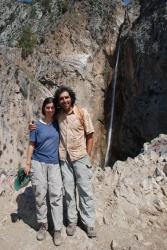 Arslanbob is turning out to be another member in our group of villages we fall in love with. This morning, after a breakfast accompanied by the sounds of chickens, the soft breeze and a light warmth from the sun, we walked to the tall waterfall. The path is a series of gravel roads leading by houses, fields, and lanes shaded by poplar trees.
Arslanbob is turning out to be another member in our group of villages we fall in love with. This morning, after a breakfast accompanied by the sounds of chickens, the soft breeze and a light warmth from the sun, we walked to the tall waterfall. The path is a series of gravel roads leading by houses, fields, and lanes shaded by poplar trees. 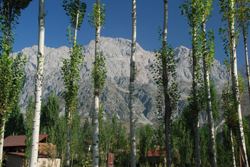
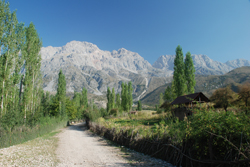
Children called out, "Hello!" and signaled to Rowshan to take their pictures, laughing at the images of themselves on the screen.
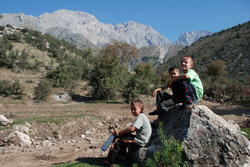
Women in beautiful floral outfits walked by carrying bundles or babies.
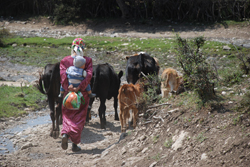
People herded cattle from one place to another. In front of us rose the mountains, a little clearer today.
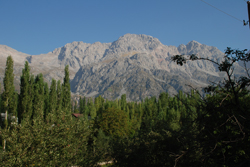
Streams bordered the road with springs sometimes bubbling at the fences. In some parts, the river had taken over the road, transforming it into multitudes of babbling channels.
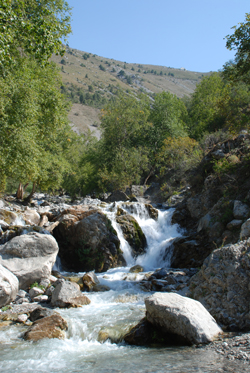
At one fork in the road, we noticed the waterfall, a long vertical silver thread suspended in the rocky mountains ahead of us. We rested in a shady grove of trees by the river, then continued to the hardest part of the trail, a steep slope with rough stones made into a long winding set of stairs.
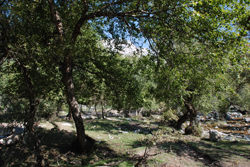
At the top was a metal fence with a sign asking people not to throw rocks down on other people. The fence and surrounding trees were covered with old rags tied to branches and poles. A little above the fence was a shady overlook where I sat admiring the 80m stream of water plummeting below to a small beach surrounded by steep cliffs.
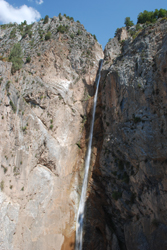
As we were admiring the waterfall, a big group of people, mostly women and girls, arrived, somehow managing the ascent wearing pretty sandals and flip flops. One had taken off her shoes and climbed barefoot.
They began to talk to Rowshan as I watched. They were from Uzbekistan. I have become really impressed by how elegantly dressed Uzbek women and girls are. They go about their daily chores (working in fields, carrying loads to and from the market) in colorful silks and velvets looking like they are about to go to a party.
Rowshan took photos of the group.
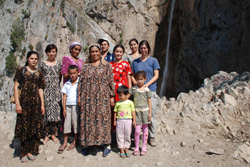
They climbed higher but we headed down to picnic by the river.
The day had gotten hotter but the walk was still pleasant. It is haying season now and we passed a field where a group of 5 young women, dressed beautifully of course, were busy gathering hay. They gestured to Rowshan to come help as he stopped to take a photo.
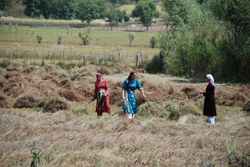
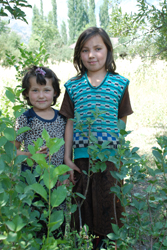
We stopped by the house where Marufdzhan's grand daughter had a bunch of friends over who were dancing.
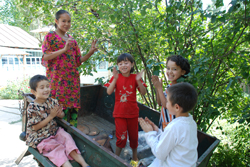
Rowshan joined in. Then we went down to relax at the chaikhane which was crowded but we were still able to grab "our place" overlooking the river. A man sitting on the corner of the platform also had a guest house (# 10) and worked as a taxi driver. Marufdzhan joined us for a bit of tea and then excused himself saying he had to go start our dinner.
Rowshan is very happy among Uzbeks here. I mentioned the ones in big cities might be different. He sees definite cultural similarities between Uzbeks and Persians and Azeris. Even I can see some traces of Persian culture absent in Kyrgyz culture. (Of course, probably the main difference is the Kyrygz were more nomadic while the Uzbeks were settled). I think he is comfortable because he knows what to expect and is happy to be among people who show the politeness of his culture: that trace of formality. We have both been amazed by how warm and friendly people are.
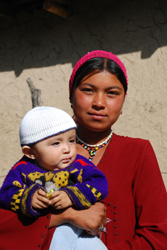
After tea, we decided to walk up the hill on the other side of the town. It looked like it wound up a steep hill but promised a beautiful view of the town with the mountains behind it. Before going we walked around the corner of a building and found the Arslanbob tomb through a painted concrete shack. The tomb was closed but an attendant showed us the exterior of the building: a simple white washed brick structure adorned with 2 horns of a Marco Polo sheep (one fallen). It looked like a modern structure and paled in comparison to the one near Turkestan. Legend has it that Mohamad gave Arslanbob the seed and he planted the first walnut grove in the area.
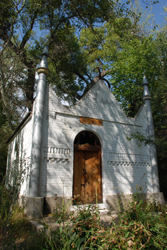
We crossed through the center of town heading west.
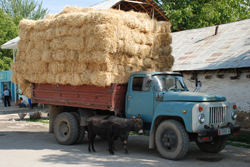
On the way up the hill, we encountered more children begging for photos and a sociable man who recommended the view from atop the hill and pointed out the road.
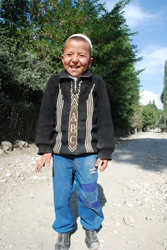
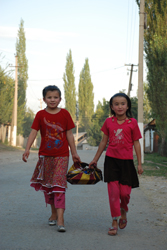
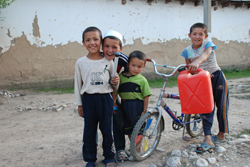
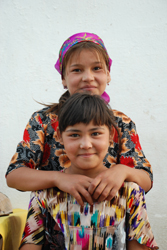
The road was a busy thoroughfare with people riding donkeys, driving horse carts and huge empty trucks going uphill and huge trucks full of hay rolling down hill.
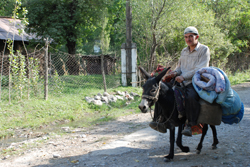
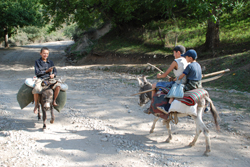
The returning hay trucks had young men waving and yelling from the top of the huge piles of hay. One group had a goat as well.
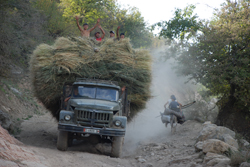
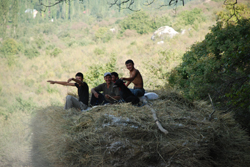
We saw trucks of sunflowers as well as occasional pieces of sunflowers on the side of the road which were eagerly snatched up by wandering cattle. There were beautiful views of the town below, a bowl of green with shining roofs.
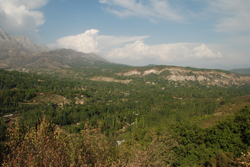
At the top of the hill, the land stretched into a plateau of rolling hills and fields of sunflowers with their seeds drying on the stem. It was like a hidden paradise. The fields were gold and green and then dropped revealing the tops of mountains beyond.
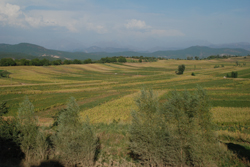
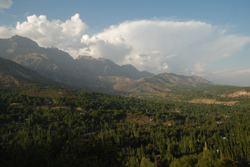
The sight must be overwhelming when the sunflowers are in bloom. Beyond the sunflowers, cows, and quickly disappearing hay were hills where walnut tree forests rose in waves. We walked a little ways up one hill admiring the impressionist vision of the fields.
On our way down we stopped by an intersection where a group of men were congregating--all greatly disgusted when a passing truck doused them in clouds of dust. When we'd passed earlier, there had just been a couple young men who asked Rowshan to take their photo. One turned out to speak Turkish fairly well. His name was Murat and he'd spent some time working in Ankara where his brother lives. Now he was busy managing the family land--a huge piece with corn, apples, sunflowers, and grazing space. The land occupied the edge of the hill and had a magnificent view of the town and mountains. He offered to take Rowshan on his land so he could shoot photos of the view. Then he accompanied us back into town. He was to be married in 5 months and hoped to travel to Mecca and become a Haji. He was bored with his life in Arslanbob but seemed to be successful since he also owned a couple shops in town, including the one we've been buying water from.
He tried to convince Rowshan to marry an Uzbek girl, move to Arslanbob and open a shop. Rowshan said he was already married to me and Murat said that I could send Rowshan money from America. Later, when Rowshan pointed out that if he opened a shop, what would Murat do since he also owned shops. His response was, "Allah will provide for us both."
Anyway, I told Rowshan if he wanted to go ahead with the plan, then he could....though I'm not sure exactly when I'd get around to sending him money... and well...it might take a while...
We headed back to the house to be there in time for dinner at 8:00.
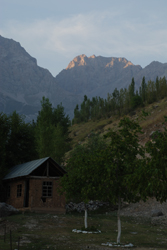
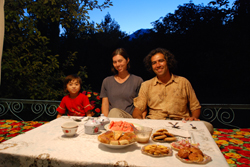
Comments
- Comments
Powered by My Blog 1.69. Copyright 2003-2006 FuzzyMonkey.net.
Created by the scripting wizards at FuzzyMonkey.net..
(Code modified by Rowshan Dowlatabadi)
Created by the scripting wizards at FuzzyMonkey.net..
(Code modified by Rowshan Dowlatabadi)

